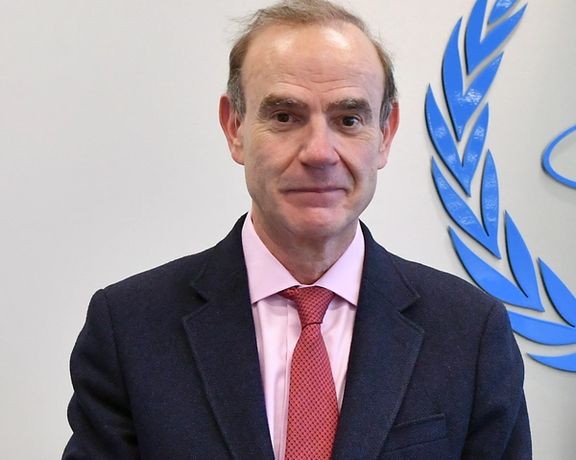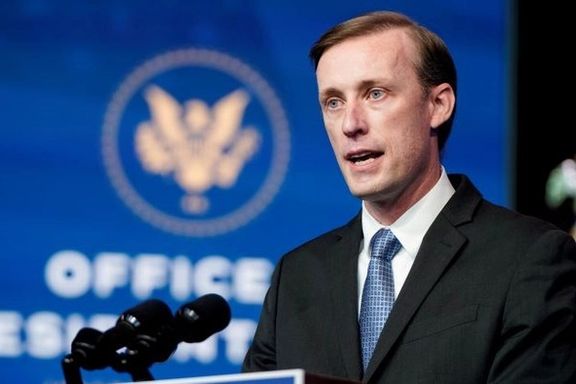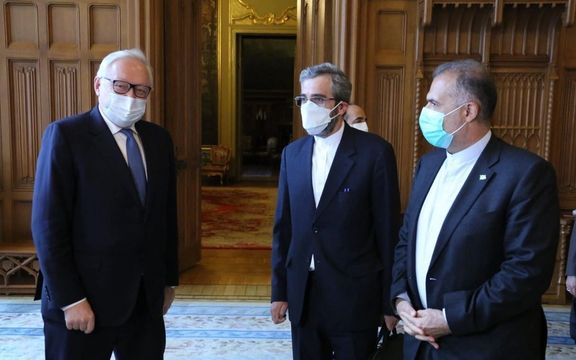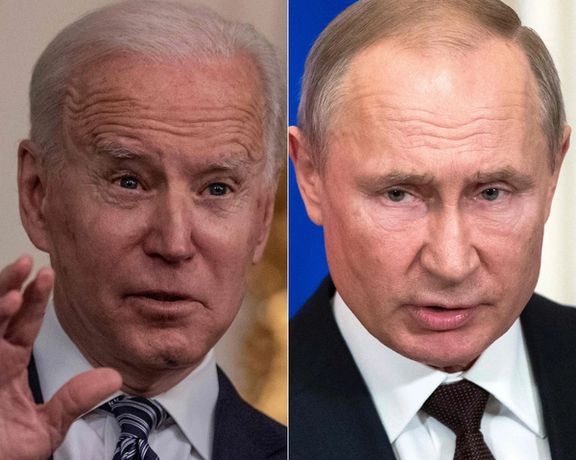Russian Envoy Says Iran And US Differ On Issues But A Deal Is Feasible

Russia’s envoy in Vienna has tweeted Wednesday that despite difference between Iran and the United States, “it is feasible” to reach a nuclear agreement.

Russia’s envoy in Vienna has tweeted Wednesday that despite difference between Iran and the United States, “it is feasible” to reach a nuclear agreement.
“Our contacts with the US and Iran at #ViennaTalks prove that both sides are very serious about restoration of $JCPOA but their visions of relevant ways and means differ,” Mikhail Ulyanov wrote.
The European Union’s coordinator of the talks to revive the Iran nuclear deal (JCPOA), Enrique Mora, announced Wednesday that negotiations will resume in Vienna on Thursday.
Last week, Russia, China, the United Kingdom, France and Germany held talks Iran’s representatives for five days that ended on Friday with any results, generating pessimism.
President Joe Biden and Russian President Vladimir Putin discussed Iran during their videoconference on Tuesday.
Iran has hardened its position since the election of hardline president Ebrahim Raisi. Western diplomats say that Tehran has reneged on compromises reached in earlier rounds of talks from April to June.
Iran is demanding that all post-2018 sanctions to be lifted at once before it agrees to return to JCPOA. Tehran is enriching uranium to as high as 60 percent, violating the agreement.

British foreign minister Liz Truss has urged Iran to return to the 2015 nuclear deal saying it was "the last chance", just a day before talks are set to resume.
"This is really the last chance for Iran to sign up and I strongly urge them to do that because we are determined to work with our allies to prevent Iran securing nuclear weapons," she told the Chatham House think tank.
"So they do need to sign up to the JCPOA (the Joint Comprehensive Plan of Action) agreement, it's in their interests to do so."
State-controlled media in Iran announced Tuesday that talks will resume Thursday and the European Union’s chief negotiator and the coordinator of the Vienna nuclear talk confirmed it on Wednesday.
Talks to revive the JCPOA resumed on November 29 after a five-month hiatus following Iran’s presidential elections in June. Iran had delayed its return to the talks, while continuing to enrich uranium, causing serious concern in Western capitals. However, after five days of negotiations talks adjourned Friday without any results, as Iran presented new demands.

Talks on reviving the 2015 Iran nuclear deal will resume on Thursday in Vienna, a senior European Union official has said, after negotiations ended without results last Friday.
"The 7th round talks will continue tomorrow Thursday in Vienna after consultations in and among capitals," Enrique Mora, who is chairing the talks, said on Twitter. "A Joint Commission and a number of bilateral and multilateral contacts will take place."
State-controlled media in Iran announced Tuesday that talks will resume on Thursday, but Mora's announcement is the first confirmation by Western diplomats.
Talks resumed on November 29 after a five-month hiatus following Iran’s presidential elections in June. Iran had delayed its return to the talks, while continuing to enrich uranium, causing serious concern in Western capitals. However after five days of negotiations talks adjourned Friday without any results, as Iran presented new demands.
France's foreign minister had said on Wednesday the talks were likely to continue, although he added that he feared Iran was playing for time.

US National Security Advisor Jake Sullivan said Tuesday that the US and Russian presidents “had a good discussion” on Iran in their teleconference on Ukraine.
“Russia and the United States actually worked well together, even in tense circumstances, back in the 2014, 2015 period to produce the joint comprehensive plan of action. This is an area where Russia and the United States can continue to consult closely to ensure that Iran never acquires [nuclear weapons],” Sullivan said.
After seven rounds of multilateral negotiations in Vienna to revive the Joint Comprehensive Plan of Action (JCPOA), Iran has presented new demands unacceptable to the United States and its three European allies who signed the 2015 agreement.
Essentially, Iran is asking for all sanctions imposed since former president Donald Trump withdrew from the agreement be lifted first before it commits itself to the limitations of the JCPOA again.
The last round of the Vienna talks ended on December 3, with no clarity as to when they will resume. Iran said Tuesday that talks will restart on Thursday, but so far others have not confirmed this.
Russia and China, Iran’s diplomatic supporters, are also signatories of JCPOA and the US needs their support to put pressure on Iran. Anecdotal information says that both Moscow and Beijing were taken aback by Iran’s positions in the Vienna talks last week, but it is not clear how far they are ready to lean on Tehran.
Sullivan stopped short of providing a clue as to what Russia is prepared to do at this juncture to persuade Iran to adopt a more reasonable negotiating posture.
Sullivan was asked if a return to the JCPOA means releasing frozen funds and lifting sanction, allowing Iran to carry on with its activities in the Middle East, a point that critics of the administration’s policy of returning to a purely nuclear deal with Iran have voiced.
Sullivan replied with the argument that the nuclear deal has no impact on Iran’s proxy forces in the region. Trump’s withdrawal from the agreement did not rein in pro-Iran groups in Lebanon or Yemen, and the opposite is also true. “Nothing about the nuclear deal stops the United states’ capacity to deal with those proxies and we are prepared to do so.,” the national security advisor said.
When Trump abandoned the nuclear agreement one his demands was that Tehran change its “malign behavior” in the region and stop grooming and supporting militant forces.
The Biden Administration has also expressed concern over Iran’s regional policies and its ballistic missile program but has argued that the JCPOA should be restored first, and other matters pursued later. But critics say that once the nuclear deal is revived the US must lift key sanctions, which would give Tehran a financial lifeline, leaving no incentive for further talks.
The Biden Administration’s Iran strategy is also based on close coordination with European allies, unlike Trump who abandoned the JCPOA against the advice of allies. Sullivan reiterated that allies are important.
“The more Iran demonstrates a lack of seriousness at the negotiating table, the more unity there is among the P5+1, and the more they will be exposed as the isolated party in this negotiation. So really the ball is in Iran’s court as to whether it wants to show up and demonstrate that it’s going to be serious or not,” Sullivan maintained.

Iranian news agencies quoted chief nuclear negotiator Ali Bagheri Kani, who is in Moscow, as saying that the Vienna nuclear talks will resume on Thursday.
Semi-official news agency ISNA quoted Bagheri as saying, "We await practical steps by the West." Earlier, the IRGC-linked news agency Tasnim had revealed that Bagheri has finalized the date for the resumption of the talks after contacting European Union coordinator Enrique Mora.
Other negotiating parties have not confirmed the Iranian report.
The talks broke off on Friday "as European officials voiced dismay at sweeping demands by Iran's new hardline government," Reuters reported, adding that the seventh round of talks in Vienna is the first with delegates sent by Iran's anti-Western President Ebrahim Raisi on how to resuscitate the agreement under which Iran limited its nuclear program in return for relief from economic sanctions.
According to ISNA, Bagheri expressed hope that his consultations with Russian officials would help Iran to continue the talks "with new and effective initiatives." Bagheri added that Iran also continues consultations with China about furthering the nuclear negotiations.
Meanwhile, expounding on Iran’s proposals presented to Europeans on Friday, Bagheri said: "What we offered in those drafts were nothing new. We had simply completed previous drafts, adding what was missing in the 2015 agreement. But in fact, European and US diplomats have said that Iran reneged on earlier compromises made during six rounds of talks from April to June.
On Tuesday, the French foreign ministry expressed “disappointment” that Vienna talks failed to move forward, saying "proposals presented by Iran... do not constitute a reasonable basis that is compatible with objective of a rapid conclusion while respecting interests of all."
In an odd comment on Monday, Iran's Foreign Minister Hossein Amir-Abdollahian said while everyone went back to their capitals on Friday, Iran kept most of its delegate in Vienna to show that it is serious about negotiations.
A website close to Iran's intelligence community said Tuesday that the make-up of Iran's negotiating team is going to change and the team's approach is going to become "aggressive."
Mashregh News reported this without quoting any sources, adding that "it is the Western side that needs to show goodwill in the 8th round of negotiations." Meanwhile, The website opined that "The more aggressive the Iranian team's approach, the more likely the West would soften its positions."
The website also called for "confronting the West's media onslaught about the Vienna talks." In another odd comment, Mashregh news claimed that "as Iranian diplomats had the upper hand in the 7th round of the talks, the US Secretary of State Antony Blinken acknowledged the US delegation's weakness in the negotiations and told Reuters that the maximum pressure policy led to the United States' isolation rather than isolating Iran."
Mashregh News also claimed that the United States is also going to change the make-up of its delegation. This comes while Iran and America's delegates do not talk to each other and dialogue between them is maintained by the delegates of other JCPOA member states. However, the website added that before the new round of the talks "The Western side should be told that Iran's only motivation in continuing the talks is gaining economic profit, otherwise, Tehran is not interested in playing with words."
In another development, a White House official told reporters on Monday that President Joe Biden will raise the issue of Iran’s nuclear program in his video teleconference with Russian President Vladimir Putin on Tuesday.
The official reiterated US concerns that Iran’s advances in its nuclear program will be discussed as a major international concern during the Biden-Putin call.

President Joe Biden will raise the issue of Iran’s nuclear program in his call with Russian President Vladimir Putin on Tuesday, the White House told reporters on Monday.
In a briefing about the crisis surrounding a Russian military buildup around Ukraine and Biden’s decision to discuss it directly with Putin, the official said, “The agenda will also cover a number of other critical issues including strategic stability, cyber, and Iran’s nuclear program.”
Talks between Iran and world powers in Vienna last week aimed at reviving the 2015 nuclear deal (JCPOA) ended without results on Friday at the dismay of the United States and its three European allies, the United Kingdom, France and Germany that are participants of the agreement. The US pulled out of the agreement in 2018 prompting Iran to expand its nuclear program.
Iran has ramped up its uranium enrichment this year, stockpiling 20 and 60-percent enriched uranium and getting closer to have enough fissile material for a bomb.
The official reiterated US concerns that Iran’s advances in its nuclear program will be discussed as a major international concern during the Biden-Putin call.